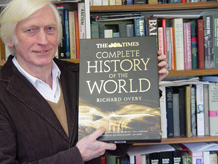
Professor Richard Overy with a copy of The Times Complete History of the World
Exeter contributes to the history of the world
History experts from the University of Exeter have contributed their geographical and subject knowledge to the latest edition of the prestigious copy of The Times Complete History of the World. The Eighth Edition has substantial new material on conflict in modern Africa, the Middle East and the United States in the 20th and 21st centuries.
Professor Richard Overy, the general editor since 1998 and historian at the University, recruits specialist consultants and oversees the production of each new edition. He said, ‘University of Exeter staff were involved because we are fortunate in having scholars with a wide geographical and thematic range. Matthias Reiss, Stacey Hynd and Catriona Pennell all contributed a good deal of important new material and have made this new edition very much an ‘Exeter product’. I hope to use them again when the Ninth Edition is prepared in three years time.’
The balance of the atlas is less Eurocentric with each new edition and the eighth is much more up-to-date on current conflicts and developments which will help to explain a lot about why Africa and the Middle East remain such trouble-spots.
The role of The Times Complete History of the World is to bring to a wide public the fruits of scholarly knowledge about the whole of human history. It seeks to help develop popular interest in history and to show that academic history is capable of being packaged in ways that makes it accessible to a wide audience.
Dr Catriona Pennell is a historian based on Exeter’s Cornwall Campus, said ‘I was delighted to be involved in such an influential publication that is accessible to many different audiences. As my research focuses on British imperial activity in the Middle East in the 20th century, I was able to contribute to the spreads which examine the historical roots of contemporary conflict. Any hope of resolving conflict in this area must start with a general and comprehensible understanding of its origins.’
Date: 6 December 2010
